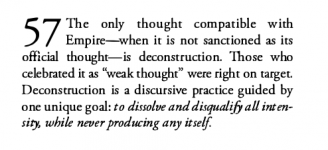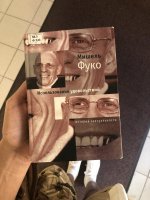
GLOSS: Nietzsche, Artaud, Schmitt, Hegel, Saint Paul, German romanticism, and surrealism: deconstruction's task is, apparently, to produce fastidious commentaries targeting anything that, in the history of thought, has carried any intense charge. This new form of policing that pretends to be a simple extension of literary criticism beyond its date of expiration is, in fact, quite effective in its own domain. It won't be long before it has managed to rope off and quarantine everything from the past that is still a little virulent within a
cordon sanitaire of digressions, reservations, language games and winks, using its tedious tomes to prevent the prolongation of thought into gesture - in short, to struggle tooth and nail against the event. No surprise that this wave of global prattle emerged out of a critique of metaphysics understood as privileging the "simple and immediate" presence of speech over writing, of life over the text and its multiplicity of significations. It would certainly be possible to interpret deconstruction as a simple Bloomesque reaction. The deconstructionist, incapable of having an effect on even the smallest detail of his world, being literally
almost no longer in the world and having made absence his permanent mode of being, tries to embrace his Bloomhood with bravado. He shuts himself up in that narrow, closed circle of realities that still affect him at all - books, texts, films, and music - because these things are as insubstantial as he is. He can no longer see anything in what he reads that might relate to life, and instead sees what he lives as a tissue of references to what he has already read. Presence and the world as a whole, insofar as Empire allows, are for him purely hypothetical. Reality and experience are for him nothing more than dubious appeals to authority. There is something
militant about deconstruction, a militancy of absence, an offensive retreat into the closed but indefinitely recombinable world of significations. Indeed, beneath an appearance of complacency, deconstruction has a very specific political function. It tries to pass off anything that violently opposes Empire as
barbaric, it deems
mystical anyone who takes his own presence to self as a source of energy for his revolt, and makes anyone who follows the vitality of thought with a
gesture a
fascist. For these sectarian agents of preventive counter-revolution, the only thing that matters is the extension of the epochal suspension that fuels them. Immediacy, as Hegel has already explained, is the most abstract determination. And our deconstructionists know well that the
future of Hegel is Empire.
Tiqqun,
Introduction to Civil War




